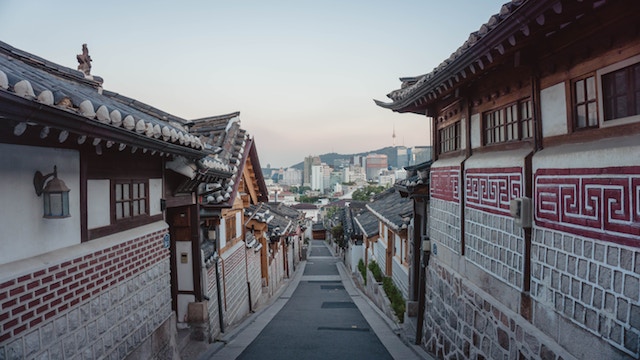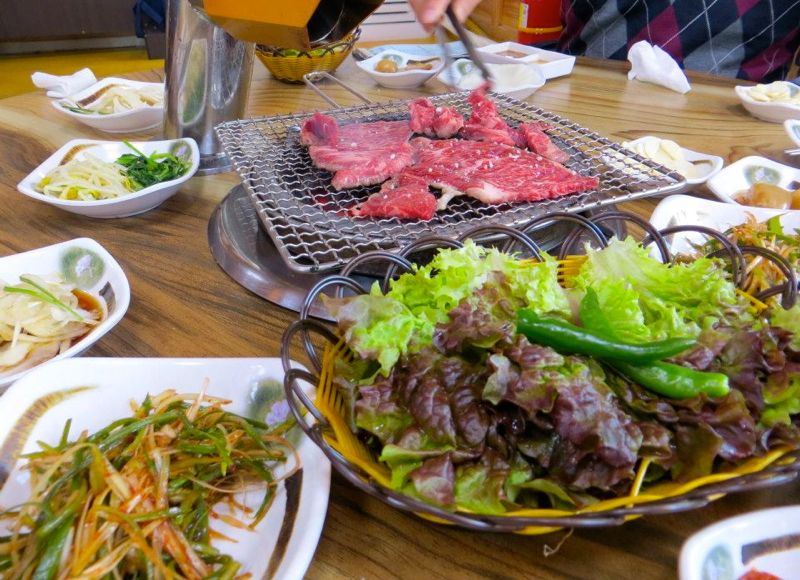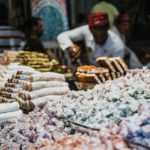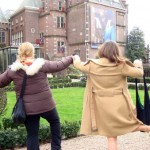So Much Culture Shock in South Korea

To say that I experienced culture shock in South Korea would be a massive understatement. Spending my spring break with my best friend, Rumi, in her hometown of Busan was one of the most eye-opening experiences of my life; I noticed so many differences between American culture and Korean culture simply from being in Seoul’s international airport. The unique food, architecture, and people of South Korea made for an unforgettable traveling experience.
So Much Culture Shock in South Korea
Culture Shock #1: Dining Out
Rumi’s parents insisted on taking us out for a huge lunch as soon as we arrived in Busan. I obliged happily, considering I hadn’t had a substantial meal since boarding the 21-hour flight from New York City. Rumi warned me before we got to the restaurant that I would have to temporarily renounce my vegetarianism in order to have a full Korean dining experience.
A fair warning to all plant-eaters: Korean restaurants serve a lot of meat. Of course, if you aren’t willing to be flexible in your diet, there are some things that are vegetarian-friendly. (Kimchi, anyone?)
Having never been a huge fan of beef or pork even before I stopped eating meat, I was unsure as to whether or not I would like the food. Nevertheless, I was willing to try. We removed our shoes at the entrance to the restaurant and sat down on the floor around a circular table.
At the center of the table was a charcoal grill, on which our waiter placed slabs of raw meat. He returned every so often, flipping and cutting it up into pieces until it was thoroughly cooked.
All my skepticism faded away with the first bite of food.
All my skepticism faded away with the first bite of food. After only eating snacks for the past 24 hours, freshly cooked meat flavored with savory oils and spices was unbelievable. I surprised myself by going for generous second and third helpings. To this day, I consider it one of the best meals I’ve ever eaten.
There is something special about eating food that you’ve just witnessed the preparation of—being able to watch and smell it cooking just makes you anticipate it that much more. And sitting on the floor without shoes made the meal feel distinctly intimate, almost as though we were enjoying a casual lunch in someone’s home as opposed to a restaurant.
For a traditional Korean dining experience, try Haeundae Amso Kalbi Jib in Busan—a restaurant famous for its beef ribs!
So Much Culture Shock in South Korea
Culture Shock #2: Culture of Collectivism
One of the biggest differences I noticed between Korean culture and American culture was the way in which Rumi interacted with members of her family. While most American teenagers regard their parents casually, Rumi appeared to talk to them in the same way she would with a respected professor.
As a result, Rumi chose where to go to college based on her parents’ wishes. She wanted to go to school in Rhode Island because most of our friends from high school were staying on the East Coast, but because her parents believed she was better suited for a school on the West Coast, that is where she decided to go.
To say that I experienced culture shock in South Korea would be a massive understatement. Spending my spring break with my best friend, Rumi, in her hometown of Busan was one of the most eye-opening experiences of my life; I noticed so many differences between American culture and Korean culture simply from being in Seoul’s international airport.
Western cultures, such as British or American, are more individualistic, while Asian and developing world cultures are more likely to be collectivist. In an individualist culture, a person defines her sense of self through her individual traits and achievements—in other words, what makes her unique and different from others. In a collectivist culture, someone defines her sense of self in relation to the larger group that she is a part of.
Just as Rumi recognizes that she is one part of the whole that is her family, South Koreans in general seem to interact with each other with the knowledge that they are all citizens of the same country. Customs like taking off one’s shoes in a restaurant or bowing when greeting a stranger or someone older reveal a degree of politeness that just isn’t present in America.
Instead, in the US, we lean on our car horns if someone cuts us off and speak curtly to a waiter if we feel we have waited too long for our food.
Culture Shock #3: Differences in Architecture
And I thought that the skyscrapers in Boston were huge! The drive from the airport to Rumi’s apartment is very clearly etched in my memory because the highways were lined with the tallest buildings I had ever seen in my life. Rumi explained that while American architecture tends to expand outwards, Korean architecture expands upwards.
If you want to see what I mean, check out the Shinesegae Department Store (Centum City Branch) in Busan. It is noted in the Guinness Book of World Records as the world’s largest department store, and even includes a wax museum, an IMAX theatre, and a skating rink. It’s pretty much a dream come true for any shopaholic.
Culture Shock #4: Lack of Diversity
I observed so many discrepancies after only a week in Busan—I couldn’t imagine how many Rumi must have noticed after years of traveling between her hometown and the US.
To my surprise, she told me that the biggest shock for her when she first came to America was how much diversity there was. “So many people from different countries live together in America,” she told me. “There is a lot of diversity in culture, race, ethnicity, and language—but there is hardly any in Korea.”
Suddenly, I realized that I probably wasn’t imagining everyone’s eyes on me as I walked through the streets of Busan with Rumi and her family. Traveling to South Korea not only allowed me to experience a culture so drastically different from my own, but also gave me a newfound awareness of the wide range of characteristics that define someone as American.
Related Reading
3 Reasons Why South Korea Stole My Heart
Curiosity, Ignorance and Racism in South Korea
Top 5 Reasons Why You Should Visit South Korea
Have you traveled to South Korea? Email us at [email protected] to share your experience in South Korea with the Pink Pangea community. We can’t wait to hear about your travels.
So Much Culture Shock in South Korea photo credits by Jessica Shen.









